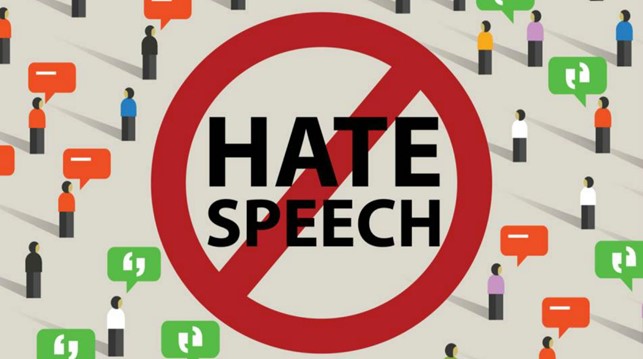Hate speech and European case law

Hate speech is increasingly becoming an issue at the domestic level – as far as Member States of the European Union (EU), but also countries the United States, the United Kingdom, Australia, are concerned – as well as at the supranational level.
At the EU level, it is being suggested that the list of crimes envisaged by the Treaty on the Functioning of the European Union (TFEU) is extended so as to include also “hate speech” offences. In this way, hate speech crimes would be equated to very serious offences already mentioned by the TFEU, such as human trafficking, child pornography, international terrorism. As stated by the European Commission in the Communication “A more inclusive and protective Europe: extending the list of EU crimes to hate speech and hate crime”, the objective is to stimulate the Council to extend the list of “EU crimes”, provided by art. 83 TFEU, to “hate speech” and “hate crime”.
At the domestic level, many courts have already ruled on hate speech matters. For instance, the Court of Justice of the European Union held that parliamentary immunity, normally applicable to opinions and votes of members of the European Parliament, cannot be applied when their statements amount to hate speech (Mylène Troszczynski v. European Parliament, Case C-12/19 P, CJEU, Fourth Section, 17 September 2020).
Many decisions of courts addressed hate speech as potential anticipation of the actual commission of terrorist offences. These judgments upheld limitations to free speech, if necessary to prevent incitement to terrorism.
Nevertheless, if one takes into consideration the case law of the European Court of Human Rights (ECtHR), it emerges that the boundaries of freedom of expression, enshrined in art. 10 of the European Convention on Human Rights (ECHR), are not so clear. Sometimes, the ECtHR held that terrorist propaganda is a legitimate manifestation of one’s thought (Süer v. Turkey, no. 77711/11, ECtHR, Second Section, 29 September 2020); in other circumstances, instead, the Court maintained that propaganda against some sexual orientations is not covered by freedom of expression, even when it does not amount to incitement to commit any crime (Vejdeland and others v. Sweden, no. 1813/07, ECtHR, Fifth Section, 9 February 2012).
One of the most significant stances of the ECtHR is that statements and declarations aimed at inciting hatred or violence based on intolerance (even on religious grounds) do not deserve art. 10 ECHR protection. Consequently, also in this case, it appears that freedom of expression is subject to many limitations, which boundaries, however, are as undefined as the notion of hate speech and hate crime is. For example, the ECtHR ruled in favour of the applicant in the Gündüz v. Turkey case (no. 35071/97, ECtHR, First Section, 4 December 2003), dealing with public incitement, by a leader of an Islamic sect, to adopt Sharia at the national level, to replace democratic principles. The Court upheld the applicant’s arguments, although he had already been convicted by a domestic court for incitement to violence, and although the Court has ruled in a following case that limitations to free speech are legitimate when someone threatens, with his/her words, territorial integrity or public security, or rejects democratic principles (Dmitriyevskiy v. Russia, no. 42168/06, ECtHR, Third Section, 3 October 2017). On the other hand, in another judgment, the ECtHR held that graphic novels with racist contents amount to a form of hate speech, and so their publication can be legitimately prohibited (Bonnet v. France, no. 35364/19, ECtHR, Fifth Section, 25 January 2022).
The ECtHR also recognized that denying historical events, like the Holocaust, is not a research activity in the field of history. Rather, this is a serious crime of incitement to hatred and defamation; hence, revisionism is incompatible with the values of the ECHR and, independently of its effects, is not covered by art. 10 ECHR, read in the light of art. 17 ECHR (Garaudy v. France, no. 65831/01, ECtHR, Fourth Section, 24 June 2003). Nonetheless, there are historical events that occurred in Europe and as serious as the Holocaust and that are still denied, to the extent it is not even possible to talk about revisionism or negationism: let us think of the Armenian genocide, perpetrated by the Ottoman Empire, or of the Slavic genocide, committed on the Ukrainian soil during the Soviet regime.
The risks connected to the introduction of new hate crimes in the European scenario, and to their equalization to particularly serious crimes, should not be underestimated, since we are in a reality – that of the EU – where the popular will is often underrepresented. As happened with crimes connected to international terrorism, the lack of a uniform and specific definition of “hate speech” and “hate crimes” could pave the way for the application of criminal law to curb undefined phenomena, with a negative impact on legal certainty and on basic principles enshrined in the Italian Constitution and in most legal systems of EU Member States.
(Focus by Lidia Autiero)
Essential Bibliography:
European Commission, A more inclusive and protective Europe: extending the list of EU crimes to hate speech and hate crime, Bruxelles, 9 December 2021, [COM(2021)777]
European Commission, Combating hate speech and hate crime, online: https://ec.europa.eu/info/policies/justice-and-fundamental-rights/combatting-discrimination/racism-and-xenophobia/combating-racism-and-xenophobia_en
M. Gibson, Censored: How European ‘hate Speech’ Laws Are Threatening Freedom of Speech, in Ecclesiastical Law Journal, 2014, 234 ss.
P. Wolny, Holodomor: The Ukrainian Famine-Genocide (Bearing Witness: Genocide and Ethnic Cleansing), New York, 2017

